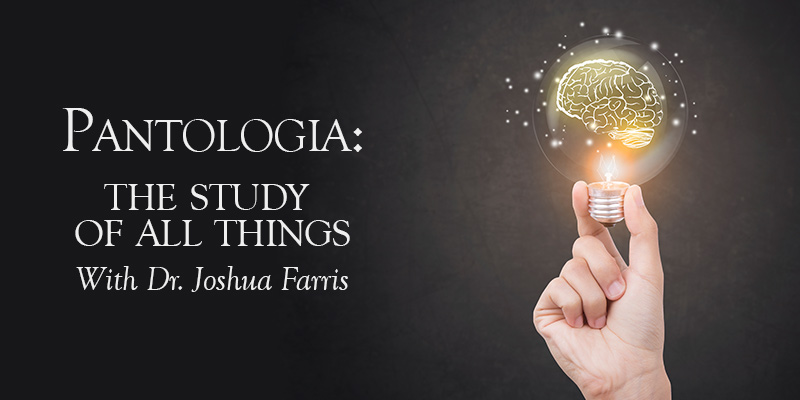The following is submitted by Dr. Joshua R. Farris, director of The Academy, and assistant professor of theology in HBU’s School of Humanities and The Honors College.
Let me begin with a brief reading from 1 Corinthians 1: “Where is the one who is wise? Where is the scribe? Where is the debater of this age? Has not God made foolish the wisdom of the world? For since, in the wisdom of God, the world did not know God through wisdom, it pleased God through the folly of what we preach to save those who believe. For Jews demand signs and Greeks seek wisdom, but we preach Christ crucified, a stumbling block to Jews and folly to Gentiles, but to those who are called, both Jews and Greeks, Christ the power of God and the wisdom of God. For the foolishness of God is wiser than men, and the weakness of God is stronger than men.” 1 Corinthians is a letter about wisdom. And it is relevant for us in our vocations as professors. We are here not simply to inform students with important facts or to prep them to fulfill certain occupational tasks. Our job, in part, is an adjunct to the job of a pastor. We are here to help move the students in the direction of wisdom by creating a wisdom culture. And, the colloquia functions to aid in that process.
I was tasked with commenting on the humanities colloquia, which is an attempt to increase cooperation between the School of Christian Thought with the School of Humanities. The title of the Colloquia is “Pantologia,” which literally means “the study of all things,” suggested by Dr. David Grubbs. In “Pantologia,” we study all things — all things relevant to the humanities. We give special attention and centrality to religious concerns, which we believe is fitting at a Christian university. As we understand it, academia is centrally focused on God and his relation to creation, and anchored in the person and work of Jesus Christ. With this in mind, we (i.e., Pantologians) believe that all of our work must be rooted in God and his relation to creation, and anchored by the University’s central confession that Jesus Christ is Lord. Theology (i.e., the study of God) has a unitive role in the process. As the “Queen of the Sciences,” one image, offered by Dr. Grubbs, comes to mind of a queen, not as some authoritarian ruler, but the queen working along with the rest of her court. In this picture, all the disciplines have some important function in leading us to truth and helping us become wise. But, this takes some rigorous and careful thinking on how to faithfully work out our disciplines in a way that is rooted in and connected to our confession of God’s work in Christ.
After some reflection, it became clear that many of the objectives found in the School of Christian Thought overlap with those of the School of Humanities. Not only that, but several professors in both schools are working on related topics impinging on broader religious concerns. By “religious concerns,” we are not intending it in a narrow sense, but in a broader sense, which encompasses a wide set of topics, concerns and disciplines that shape and sustain a vision of our world.
Just to give you a sense of some of the relevant topics, over the past year, we covered several interesting topics on a spectrum of varied disciplines. One of our recent Academy hires, Dr. Tyler D. McNabb, explored one issue in divine providence. Dr. Bruce Gordon touched on problems with methodological naturalism and the need for divine explanation. One of our History professors, Dr. David Davis, advanced several different 17th-century views on ecstatic visionary experiences. Dr. Emily Stelzer, our English literature professor, touched on one aspect of John Milton — her area of expertise. Dr. Anthony Joseph, another History professor, gave a talk on the history of abortion in the U.S. Dr. Paul Sloan, faculty member in the SCT, explored the nature of sacrifice in the Bible and its relevance today.
This fall, we have several talks in store, and you are all welcome to come. Dr. Robert Llizo, part of the Honors College, will be giving a talk on Thomas’s view of beatific vision and the body’s relation to it. Additionally, Dr. David Grubs, Dr. Tyler McNabb, Dr. Bruce Gordon and others will be presenting. Appropriately, I believe, in honor of Reformation 500, we are meeting to discuss Dr. Kevin J. Vanhoozer’s work, “Biblical Authority After Babel,” where he touches on the distinctives of the Protestant-Reformation tradition.
Other topics and workshops in store for the future include discussions of gender and sexuality, and the use of literary critical theory in contemporary society. We will see what else pops up as time moves on.
To summarize, Pantologia exists for three reasons. First, we exist to advance scholarship. By creating a community that aids careful critical thinking about our own disciplines, we influence a culture of research. This naturally feeds into the next point. Second, we exist to influence the wider academic discussions. Finally, we believe that this keeps our teaching freshly linked to contemporary discussions. This is the third. We exist to aid one another in our teaching objectives.








